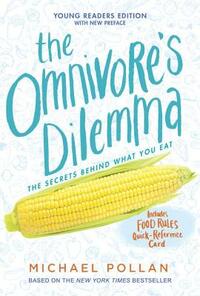Take a photo of a barcode or cover
An excellent look in to food industry, and the unsustainable bureaucracy behind it.
informative
reflective
medium-paced
Eh. Maybe I'm reading this 7 years too late or I'm involved in the issues to read it normally. The science writing is superb, but find the rest of his commentary sort of annoying.
The subject matter is fascinating and incredibly important. Pollan explores the various ways we humans, as omnivores, can feed ourselves, beginning with a look at the giant industries of corn and soybean farming and Concentrated Animal Feeding Operations (CAFOs), then looking at whether organic farming is an improvement, visiting a small, self-sustaining farm, and finally exploring hunting and gathering by preparing a meal almost entire from things found or killed himself.
Pollan is thorough in his research and clear in his explanations, and I appreciate that about the book. I already knew much of the most shocking information about the food industry from reading Animal, Vegetable, Miracle, but I still learned a lot (though it's still hard not to come away completely depressed by the state of the food industry -- maybe why Pollan structured the book to go from industrial to intimate). Pollan's descriptions of how beautifully nature works together when properly structured were wonderful and inspiring, and gave a sense of needed hope to what can be a difficult subject matter. I also found his chapter on eating meat to be more or less well done.
I did find his writing hit or miss, which is why it's not a 5-star book for me. This was actually my second time reading the book because I abandoned it during the first section the first time. Much of the book drags with excessive description and explanation, and Pollan enjoys using large words that don't always fit quite right in the context. He also repeats himself, using quips about a "free lunch" multiple times and making the same commentary on the same Wendall Berry quotation at least two different times. I wished the book was easier (and less annoying) to read because the information it contains is so eye-opening that I would recommend this widely. On the other hand, when Pollan's writing is good, it's excellent, and I had more lengthy highlights on my Kindle for this book than probably any other.
It's worth a read if you're willing to stick with it. (You may decide to become a vegetarian and/or locavore.)
Pollan is thorough in his research and clear in his explanations, and I appreciate that about the book. I already knew much of the most shocking information about the food industry from reading Animal, Vegetable, Miracle, but I still learned a lot (though it's still hard not to come away completely depressed by the state of the food industry -- maybe why Pollan structured the book to go from industrial to intimate). Pollan's descriptions of how beautifully nature works together when properly structured were wonderful and inspiring, and gave a sense of needed hope to what can be a difficult subject matter. I also found his chapter on eating meat to be more or less well done.
I did find his writing hit or miss, which is why it's not a 5-star book for me. This was actually my second time reading the book because I abandoned it during the first section the first time. Much of the book drags with excessive description and explanation, and Pollan enjoys using large words that don't always fit quite right in the context. He also repeats himself, using quips about a "free lunch" multiple times and making the same commentary on the same Wendall Berry quotation at least two different times. I wished the book was easier (and less annoying) to read because the information it contains is so eye-opening that I would recommend this widely. On the other hand, when Pollan's writing is good, it's excellent, and I had more lengthy highlights on my Kindle for this book than probably any other.
It's worth a read if you're willing to stick with it. (You may decide to become a vegetarian and/or locavore.)
Thought for food...
[b:The Omnivore's Dilemma: A Natural History of Four Meals|3109|The Omnivore's Dilemma A Natural History of Four Meals|Michael Pollan|https://images.gr-assets.com/books/1393804353s/3109.jpg|3287769] is a biological look at the food we consume. [a:Michael Pollan|2121|Michael Pollan|https://images.gr-assets.com/authors/1366396171p2/2121.jpg] has broken the book into three different sections. Each section ends with a meal made from the plants and animals described in each section.
In Part I: Industrial Corn we follow the industrial food chain to see the technology and challenges with mass produced food in America. Corn is the main focus, but you learn about the entire food chain along the way. I found this section of the book shocking and disturbing, but very educational. Ignorance is not bliss.
Part II: Pastoral Grass focusses on the alternative food chain of organic food, small farm co-ops and grass-fed animals. There were a few surprises along the way, but they were far less disturbing than section one.
Finally, Part III: Personal the Forest follows [a:Michael Pollan|2121|Michael Pollan|https://images.gr-assets.com/authors/1366396171p2/2121.jpg] along his quest to make a meal from things he hunted, grew or gathered. This section felt very philosophical.
Overall, [b:The Omnivore's Dilemma: A Natural History of Four Meals|3109|The Omnivore's Dilemma A Natural History of Four Meals|Michael Pollan|https://images.gr-assets.com/books/1393804353s/3109.jpg|3287769] was thoroughly researched, well written and extremely thought provoking. If you are interested in learning about where your food comes from and how it is processed, you will likely enjoy this book. Those of you who want to stay healthy or enjoy cooking will also enjoy this book. As a vegetarian, I found a few sections describing slaughter difficult but I didn’t skip ahead. I felt as though I owed it to the farm animals to learn about their lives and ultimately their deaths.
Highly recommended
[b:The Omnivore's Dilemma: A Natural History of Four Meals|3109|The Omnivore's Dilemma A Natural History of Four Meals|Michael Pollan|https://images.gr-assets.com/books/1393804353s/3109.jpg|3287769] is a biological look at the food we consume. [a:Michael Pollan|2121|Michael Pollan|https://images.gr-assets.com/authors/1366396171p2/2121.jpg] has broken the book into three different sections. Each section ends with a meal made from the plants and animals described in each section.
In Part I: Industrial Corn we follow the industrial food chain to see the technology and challenges with mass produced food in America. Corn is the main focus, but you learn about the entire food chain along the way. I found this section of the book shocking and disturbing, but very educational. Ignorance is not bliss.
Part II: Pastoral Grass focusses on the alternative food chain of organic food, small farm co-ops and grass-fed animals. There were a few surprises along the way, but they were far less disturbing than section one.
Finally, Part III: Personal the Forest follows [a:Michael Pollan|2121|Michael Pollan|https://images.gr-assets.com/authors/1366396171p2/2121.jpg] along his quest to make a meal from things he hunted, grew or gathered. This section felt very philosophical.
Overall, [b:The Omnivore's Dilemma: A Natural History of Four Meals|3109|The Omnivore's Dilemma A Natural History of Four Meals|Michael Pollan|https://images.gr-assets.com/books/1393804353s/3109.jpg|3287769] was thoroughly researched, well written and extremely thought provoking. If you are interested in learning about where your food comes from and how it is processed, you will likely enjoy this book. Those of you who want to stay healthy or enjoy cooking will also enjoy this book. As a vegetarian, I found a few sections describing slaughter difficult but I didn’t skip ahead. I felt as though I owed it to the farm animals to learn about their lives and ultimately their deaths.
Highly recommended
informative
inspiring
reflective
slow-paced
What a cool book. Pollan is such a great writer and the way he structured this book made a lot of sense. I learned SO much about where food in America comes from, and I also was able to build empathy for other ways of living and eating that are different from my own.
Honestly this book was hard for me to get into. Perhaps because it is not my usual genre. The first chapter about corn while super informative, felt like it was bit much even though I understand he was trying to give us a solid base for how corn came to rule the world. He Nathanial Hawthorne-d it. With that said, Michael Pollan is no doubt well informed on the subject of food. I loved his discussions in the documentaries Food Inc. and Fed Up.
informative






